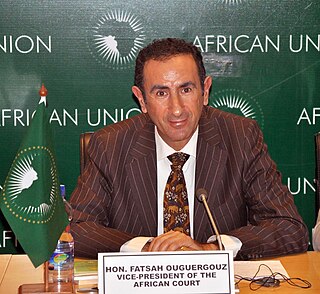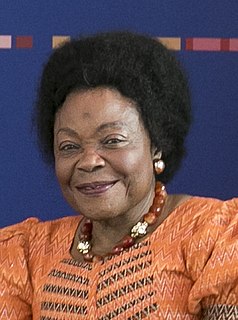
The European Court of Human Rights, frequently referred to as the Strasbourg Court, is a supranational or international court established by the European Convention on Human Rights. The court hears applications alleging that a contracting state has breached one or more of the human rights provisions concerning civil and political rights set out in the convention and its protocols.

Uganda is a presidential republic, in which the President of Uganda is both the head of state and head of government. There is a multi-party system. Executive power is exercised by the government. Legislative power is given to both the government and the National Assembly. The system is based on a democratic parliamentary system with equal rights for all citizens over 18 years of age.

The Inter-American Court of Human Rights is an autonomous judicial institution based in the city of San José, Costa Rica. Together with the Inter-American Commission on Human Rights, it makes up the human rights protection system of the Organization of American States (OAS), which serves to uphold and promote basic rights and freedoms in the Americas. The Court rules on whether a State has violated an individual's human rights, rather than if individuals are guilty of human rights violations.
The United Nations Prizes in the Field of Human Rights were instituted by United Nations General Assembly in 1966. They are intended to "honour and commend people and organizations which have made an outstanding contribution to the promotion and protection of the human rights embodied in the Universal Declaration of Human Rights and in other United Nations human rights instruments".

The Federal Supreme Court of Switzerland is the supreme court of the Swiss Confederation. As part of the judiciary, it is one of the three branches of government in Switzerland's political system.
The African Commission on Human and Peoples' Rights (ACHPR) is a quasi-judicial body tasked with promoting and protecting human rights and collective (peoples') rights throughout the African continent as well as interpreting the African Charter on Human and Peoples' Rights and considering individual complaints of violations of the Charter. This includes investigating human rights violations, creating and approving programs of action towards encouraging human rights, and set up effect communication between them and states to get first hand information on violations of human rights. Although the ACHPR is under a regional government facility, they don't have any actual power and enforcement over laws. This ends up in them drafting up proposals to send up the chain of command to the Assembly of Heads of State and Government and they will act accordingly.

Southern Cameroons was the southern part of the British mandate territory of British Cameroons in West Africa. Since 1961 it has been part of the Republic of Cameroon, where it makes up the Northwest Region and Southwest Region. Since 1994, pressure groups in the territory claim there was no legal Document in accordance to UNGA RES 1608(XV) paragraph 5, and are seeking to restore statehood and independence from the Republic of Cameroon. They renamed British Southern Cameroons as Ambazonia.
The African Court on Human and Peoples' Rights is a continental court established by African countries to ensure protection of human and peoples' rights in Africa. It complements and reinforces the functions of the African Commission on Human and Peoples' Rights.

Dr. Fatsah Ouguergouz is an Algerian national born in France. He has served as a Justice of the African Court of Human and Peoples' Rights since 2006 and as Vice-President of this Court since September 2012. Elected initially in 2006 by the Assembly of Heads of State and Government of the African Union, he was re-elected in 2010 for a six-year mandate.
Jean Emile Somda was a judge from Burkina Faso who served on the African Court on Human and Peoples' Rights from 2006-2008.

Gerard Niyungeko was a Judge of the African Court on Human and Peoples' Rights, a position he was appointed to in 2006.

Sophia Abena Boafoa Akuffo was the Chief Justice of Ghana from 2017 until 20 December 2019. She had been a Judge of the Supreme Court of Ghana since 1995.

Sir Nicolas Dušan Bratza is a British lawyer and a former President of the European Court of Human Rights.

Sanji Mmasenono Monageng has been a judge of the International Criminal Court (ICC) since 2009.

Jean-Paul Costa is a French jurist and was the President of the European Court of Human Rights since 19 January 2007. He was first appointed a judge of the Court on 1 November 1998, and in 2009 was elected to serve an additional three years as President. His term at the Court ended on 3 November 2011.

Joyce Aluoch is a Kenyan lawyer who served on as Judge of the International Criminal Court from 2009 unti 2018. She is a former judge of the High Court of Kenya. In addition to her career as a judge, she was the First Chairperson of the Committee of African Union Experts on the Rights and Welfare of the Child and the Vice-Chairperson of the United Nations Committee on the Rights of the Child from 2003 to 2009. She has also served as the inaugural head of the family division of the Kenyan High Court and a member of the Court of Appeal.
The African Court of Justice and Human Rights (ACJHR) is an international and regional court in Africa. It was founded in 2004 by a merger of the African Court on Human and Peoples' Rights and the Court of Justice of the African Union. It is the primary judicial agency of the African Union.
Elsie Nwanwuri Thompson is a judge of the High Court of Rivers State. Born and raised in Port Harcourt, she served as the Country Vice President and National President for the International Federation of Women Lawyers Nigeria. She is also a resource person at seminars and conferences. On 27 July 2010, she became the first Nigerian to be elected to the African Court on Human and Peoples' Rights for a six-year term. She was Vice President of the court from 2014 to 2016.
Ntyam Ondo Suzanne Mengue Zomo is a Cameroonian jurist who was elected to the African Court on Human and Peoples' Rights for a six-year term in 2016.












